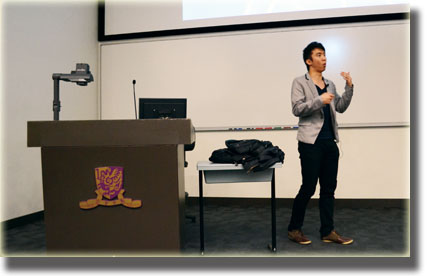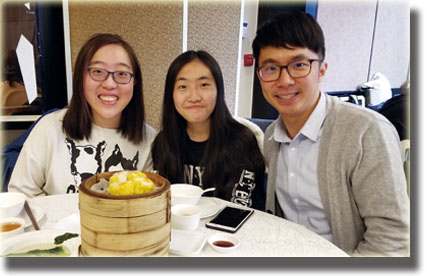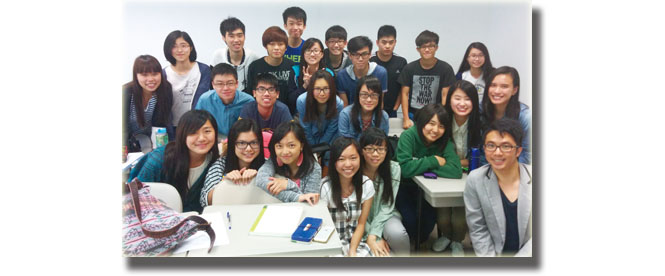Teaching Philosophy
In a world rapidly shaped by technological advancement, students are exposed to overwhelming information from social media all the time and may have their beliefs and values molded unconsciously. As a teacher, I always strive for cultivating my students to become a reflective person who can consider carefully when making judgment, and can scrutinize his/her underlying values, beliefs, assumptions and presuppositions from multiple perspectives. I believe this process and mindset allow students to understand better the rationale that governs their actions and judgments. Moreover, they can evaluate the meaning of those judgments and develop alternative approaches. Such skill is crucial for students' intellectual development and for helping them to make rational decisions in the face of different challenges in their daily lives.
Teaching UGFN1000 In Dialogue with Nature provides me an excellent opportunity to put my teaching philosophy into practice. The course is so designed that it is not merely conducive to widening students' vision other than their major discipline, but also provides an excellent platform for students to reflect on different ways of thinking including their own. To achieve this, a teacher should play three essential roles: (1) facilitate students' understanding of the course materials and their exploration of relevant knowledge so they can approach the issues from various perspectives; (2) facilitate students' integration of the knowledge with their personal thoughts or beliefs; and (3) constantly reflect on and refine his teaching practices from students' perspective.

Fundamentally, I believe the understanding of various thoughts is prerequisite for having a good reflection process. Besides the conventional face-to-face lecturing, I have contributed to the development of several learning support aids with a team of General Education Foundation Programme teachers to promote students' understanding and exploration of relevant knowledge. A mobile application called "DiaNable" was developed to act as a reading companion that allows students to clarify the concepts by themselves through multiple choices questions. Moreover, a set of online micro-modules is developed to explain the basic scientific concepts that are essential to the understanding of the assigned texts as well as to help students to appreciate diverse viewpoints of each classic.
To be a reflective person, one should not rest and stop in the phase of understanding the knowledge. Students should internalize the knowledge and integrate knowledge with their thoughts. This can be facilitated by an appropriate design of discussion questions and learning activities. I have been adopting various teaching and learning (T&L) activities for promoting students' reflection, such as utilizing interesting video clips as a prompt, role-playing debate, and mini-games to arouse students' interest and engage them in a more interactive discussion. However, a reflective process is not always a comfortable process as it does not only involve rationality but also triggers emotional responses, especially when the person encounters ideas that contradict with his/her core values or religious belief. On those issues, I present myself as the students' companion and share with them my own experience in the thinking process, such as how I would approach the problem logically; the struggle and emotion aroused when I encounter something contradicting, and the process of how I would gradually reshape my views. For instance, in one of my classes when we discussed the questions on "the origin of human," I shared my struggles in dealing with the conflict between the scientific knowledge and my religious belief. This probably lets students feel that they are not alone and gives them the motivation to go on.

Not only hoping my students would be reflective, I always remind myself to be a reflective teacher. Teaching and learning are tightly connected; it is crucial for me to evaluate my teaching from the students' perspective. I am involved in several pedagogical research projects which make use of both quantitative and qualitative methods to evaluate students' attainment of the course intended learning outcomes (ILOs), students' perceived effectiveness of various learning activities and supporting learning tools, students' social presence in the tutorial discussion, and students' learning strategies. The results have informed me of the efficacy of the current pedagogies and helped me to refine the lesson designs.
I believe the three elements above can produce a drive towards continuous improvement of the learning experience of students in the course and bring the General Education Foundation Programme forward. Through general education, I wish students can experience the joy of intellectual exploration by scrutinizing their underlying values, beliefs, and presuppositions. I believe this sense of enjoyment will become an intrinsic motivation for students to continue the reflective practice learnt in GEF throughout their life-long journey.
Finally, I would like to express my heartfelt gratitude to all my colleagues in the GEF programme. All the learning support tools mentioned above are the collaborative ideas and efforts from various teams of GEF teachers. Moreover, I have been inspired by the valuable teaching experiences and pedagogies shared by my colleagues, which significantly contributed to the development of my teaching practice and made me a better teacher.

|










